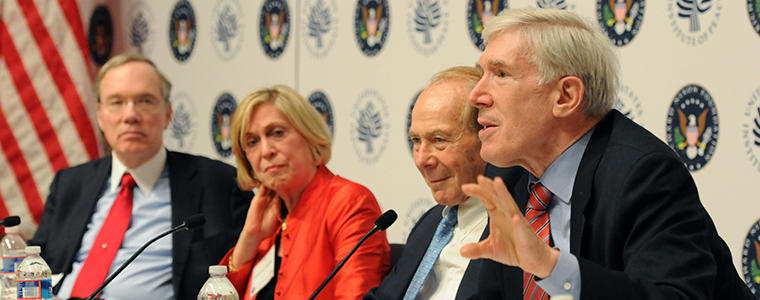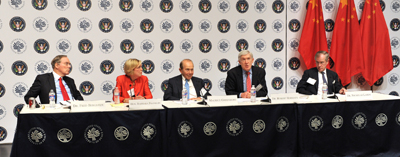Coping with an Economic Juggernaut
How does the U.S. – and the world – cope with the economic juggernaut that is China?

How does the U.S. – and the world – cope with the economic juggernaut that is China?
Such was the main question that leading experts set out to tackle in a panel discussion during the daylong U.S.-China conference, “The Week that Changed the World,” co-sponsored by the U.S. Institute of Peace and the Richard Nixon Foundation.
 Moderator Fred Bergsten, director of the Peterson Institute for International Economics, opened the discussion by providing historical context. When President Richard Nixon made the historic trip to Beijing 40 years ago, economics was not high on the agenda because China’s economy was profoundly smaller. . But the reforms China implemented in the years following the Nixon trip led to its fantastic and superlative economic development we see today, Bergsten said.
Moderator Fred Bergsten, director of the Peterson Institute for International Economics, opened the discussion by providing historical context. When President Richard Nixon made the historic trip to Beijing 40 years ago, economics was not high on the agenda because China’s economy was profoundly smaller. . But the reforms China implemented in the years following the Nixon trip led to its fantastic and superlative economic development we see today, Bergsten said.
Bergsten kicked off the discussion with the big question: what is the aggregate balance between China as an opportunity for and as a challenge to the U.S. in terms of economic relations?
Robert Hormats, undersecretary of State for Economic Growth, Energy, and the Environment, fielded the question first, saying there were far more opportunities than challenges – but the key was knowing how to frame the narrative in how to deal with China. Furthermore, as Hormats stressed, the U.S. should not bilateralize the relationship and issues that come up. Instead, he said, it is much more constructive to put issues in a global context as well as appealing to China’s reform-minded leaders. Otherwise, we stand to create a bilateral confrontation, he said.
Maurice "Hank" Greenberg, chairman and CEO of C.V. Starr Co., Inc., reflected on his first trip to China in 1975, describing that even then there was “this bottled up intensity to do more economically.
Nicholas Lardy, a senior fellow at the Peterson Institute for International Economics, said the misperception that China is an economic threat to the U.S. itself posed a major challenge to the relationship. While China is an economic superpower, their earning power is far less than that of Americans, with the average income in China about $50 a week. Lardy said this has an enormous impact on the competition between the U.S. and China, cautioning that we wouldn’t want to compete on labor-intensive industries because –with China’s huge population of more than 1.3 billion people – we will lose. But, we risk potential opportunities if we view China only as taking away U.S. jobs and being a threat to our economy.
Barbara Franklin, the president and CEO of Barbara Franklin Enterprises who served as the Secretary of Commerce in the administration of President George H.W. Bush, observed how we are just beginning to realize the many opportunities. While there are things that China needed to do, she said, there are also changes the U.S. needs to make in order to become more competitive and maximize the potential of the economic relationship, such as lowering our deficit and revamping our tax code.
Bergsten summarized that all the panelists agreed that the opportunities far outweigh the challenges in the relationship. He next asked what economic problem was the most pressing.

Franklin and Hormats agreed that intellectual property rights enforcement was among the most pressing. Franklin also ranked the need for an open investment environment (ie, transparency) and China’s preferential treatment of state-owned enterprises also as very high priorities. As an official in the Obama administration, Hormats said the U.S. has made some progress on intellectual property protection, but not enough. He said that characterized many other problems as well – progress is made, but not enough and not fast enough.
Lardy pointed out that China’s current economic growth model was not going to be very effective going forward, and that China needed to implement structural reforms, such as increasing private expenditure. He said such a change would not only be good for China, but the world would benefit as well.
Hormats picked up on Lardy’s point, saying such a change could serve both countries’ national interests. He said China needs to rebalance its economic model for its own sake, and that the U.S. needs to work with them to get there. We can’t lecture to them, and we have to go about this in a constructive way by appealing to their internal needs and framing the issue as a change that will benefit China.
In light of his decades of doing business in China, Greenberg reflected that even though the degree of progress may seem slow for Americans, we needed to stay patient.
Bergsten’s final question was whether we needed to form a “G-2.” Across the board, the panelists said “no.” Hormats said the U.S. and China are the world’s two biggest economies and nothing can get done if they don’t agree – but at the same time, other smaller economies need to be involved. Franklin said that while she didn’t think a G-2 was necessary, she recommended “constant consultation” from the presidential level all the way done. She observed that neither the U.S. nor China is used to consulting, but is more used to acting unilaterally.



